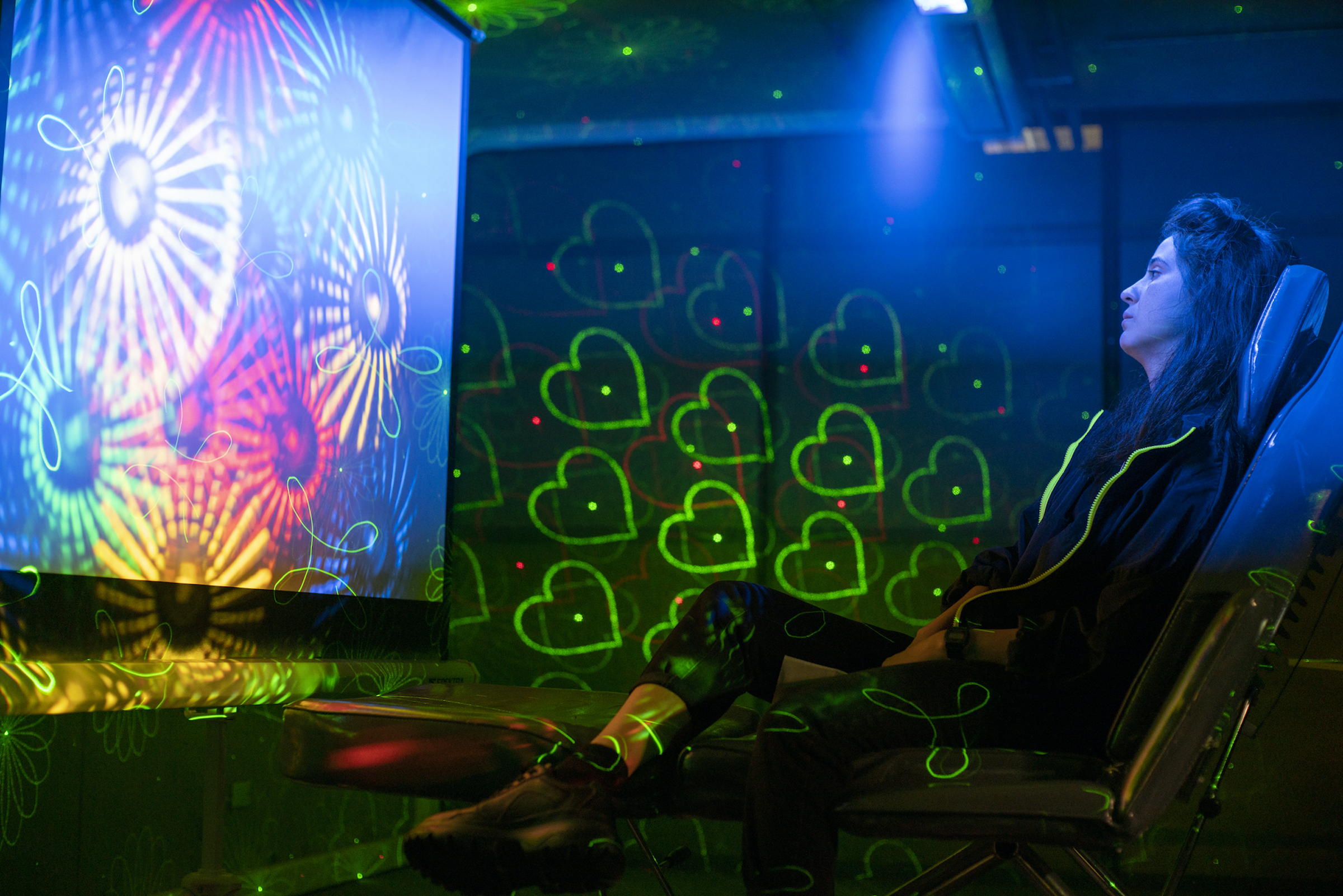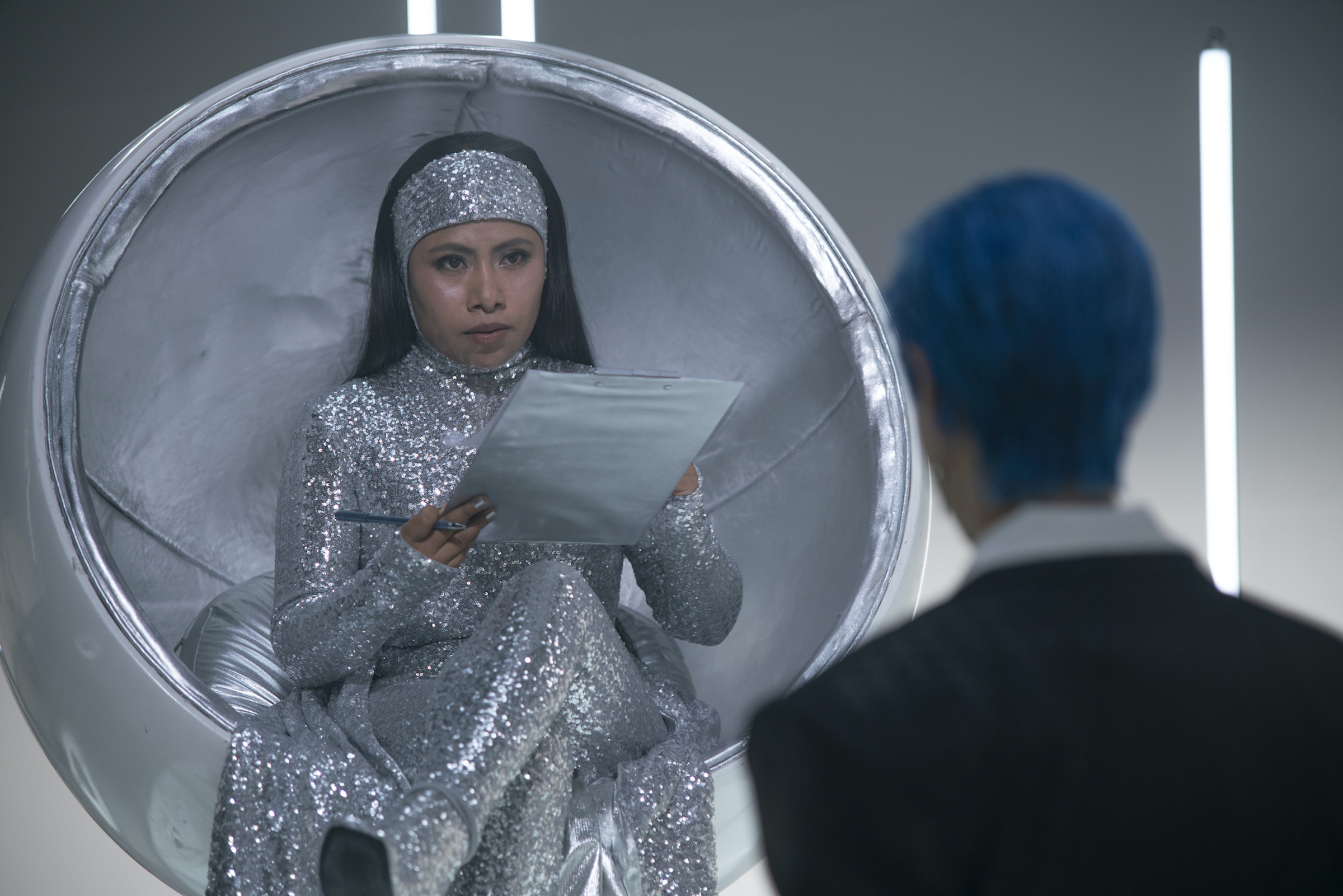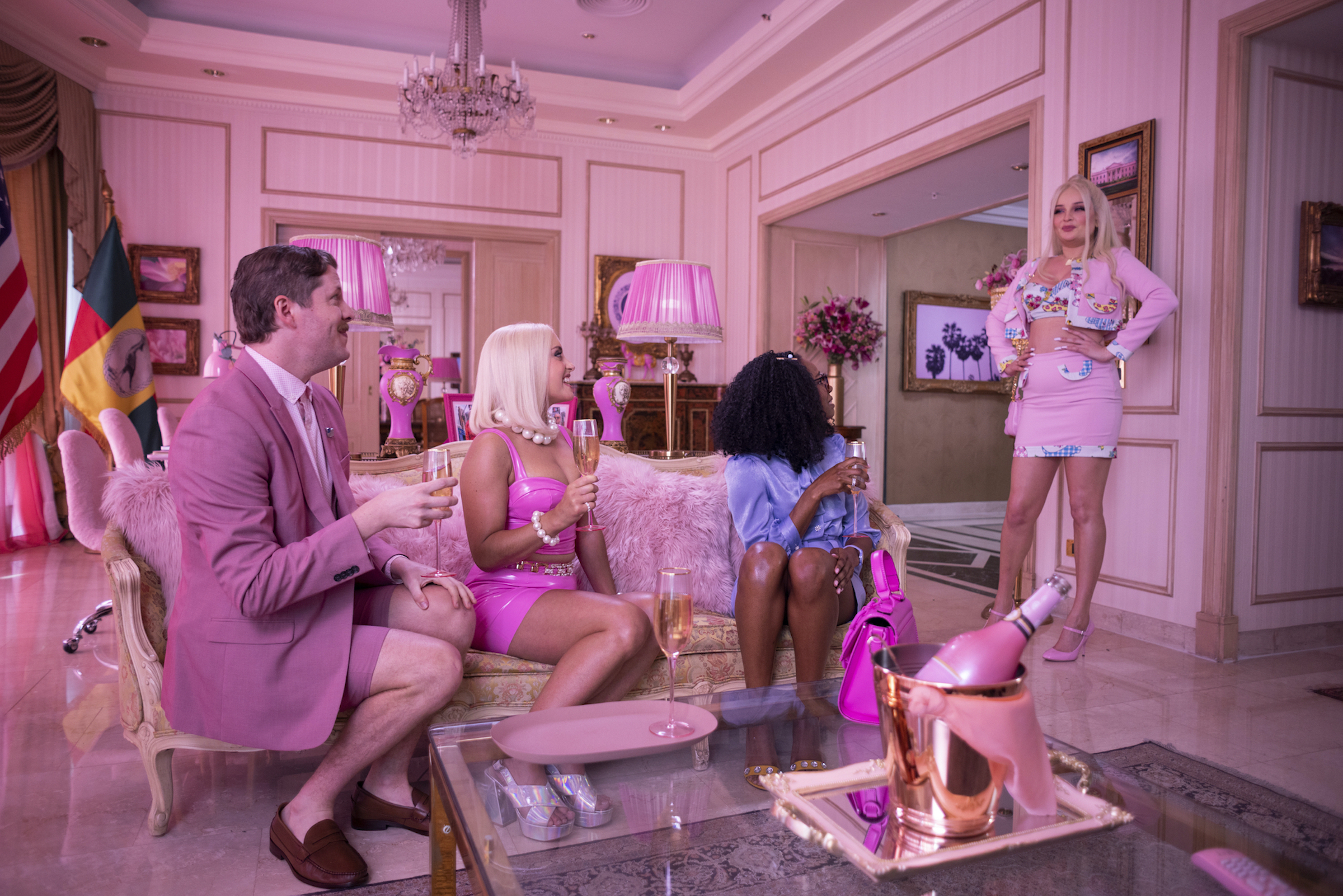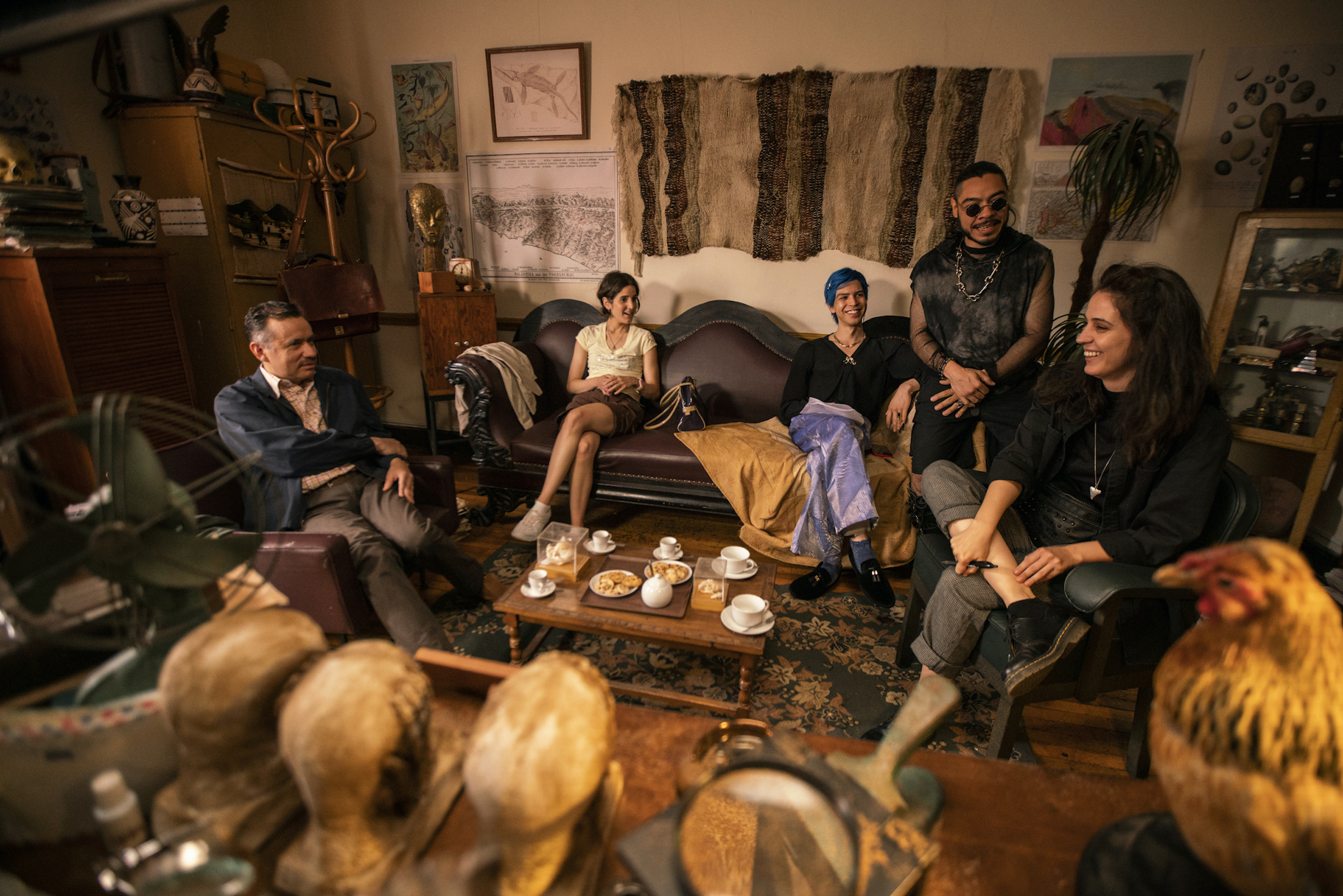There’s one screenshot from the second season of the Spanglish comedy Los Espookys that I can’t stop sending to my friends.
The Espookys—a group of four friends who stage “spooks” straight out of B horror films—have just wrapped up a gig in a graveyard when Úrsula (Cassandra Ciangherotti) stumbles across a curious flier. “Free radical queer vegan tarot book swap,” she reads by flashlight. Glancing around, she folds up the flier and tucks it away, smiling to herself.
It feels too good to be true—and it is. The genius dramatic irony here, as loyal viewers know, is that Úrsula has a target on her back.
Last season, we were introduced to Mira Esto, a sly spoof of sensational Latin American news shows. (Think: Univision’s Primer Impacto or El Salvador’s Noticias 4Visión.) The conniving producers behind the show, we learn, have kidnapped and hypnotized a string of women (all dubbed Gregoria Santos) to host it. Each woman, apparently indistinguishable from the next, presents outlandish stories about celebrity scandals and the paranormal with deadpan delivery, and the audience laps it up.
Now, the producers are on the prowl for the ninth Gregoria Santos, and Úrsula fits the bill. So far, though, she’s expertly evaded capture. “Wait a second…” she asks the anxious receptionist at the “book swap.” “Don’t I know you?”
“No, no!” he stutters, frantically waving a rainbow-striped fan. “Love is love. I’m a dairy-free Sagittarius.”
Trying to find a risograph workshop in Brooklyn through an unmarked door, I had to wonder: Is this how Mira Esto gets me? The flier is a parody of Úrsula’s interests, poking fun at the identities of a core demographic of the show’s audience—myself included.

Los Espookys, which premiered on HBO in 2019 and just wrapped its second season, is self-aware in the smartest way. It never takes itself too seriously, but the topics it skewers—from the objectification of women to unpaid internships to U.S. interference in Latin American politics—are no joke. The show is open by design, inviting everyone in just to satirize them, all in good fun. It’s completely in Spanglish—all Spanish lines are automatically subtitled in English and vice versa—allowing it to straddle cultures and crack jokes that will land with viewers who speak either language, or both. And it’s intrinsically queer, a respite for LGBTQ+ viewers among media that still often tokenizes queer characters—or panders to queer audiences.
The series slots into the wave of contemporary queer horror (think: Bodies Bodies Bodies, First Kill, Fear Street) as queer creatives reclaim a genre that has long vilified them. Horror tropes—from exorcisms to cursed mirrors to spirits in the cemetery—abound in Los Espookys, but they’re more kooky than scary. There’s the water spirit who lives inside one character, Andrés (played to raspy perfection by Spike Einbinder), but quits because it wants to focus on its career, and the portal Andrés can open to hang out with the moon (personified by Roma’s Yalitza Aparicio). For queer viewers, comedy lovers, and those looking for something not too spooky, the show makes for a great Halloween binge.
Read more: A New Documentary Series Illuminates the History and Evolution of Queer Horror

But its themes aren’t seasonal. Los Espookys critiques the U.S.’s long history of detrimental intervention in Latin America and willful American ignorance toward other cultures. And it manages to do so while maintaining its tongue-in-cheek, oddball charm.
Take, for example, Greta Titelman’s obnoxious Melanie Gibbons, the U.S. ambassador to the fictional Latin American country where Los Espookys takes place. Dripping in bubblegum pink, Melanie aims to become the U.S. Ambassador to Miami—a role she sincerely believes exists. But first, she must dutifully serve her nation’s interests.
“We need to influence local elections and make sure their president gets re-elected,” Melanie drily instructs her aides. “It’s what our Founding Fathers would’ve wanted. So, we need to start spreading lies about his opponent in a clear and concise way.”
“OK, so memes?” an aide asks.
“Wait, do these memes have to be in Spanish?” asks an embassy assistant. “How are we supposed to do that?”
“Just write them in English,” another assistant replies. “If it’s in English, it’s for everybody.”
Read more: Vampires Are Taking Over Pop Culture Again—But This Time, the Monster Is Us

Stylistically, the show defies categorization, perhaps better explained by its central characters. Renaldo (Bernardo Velasco) is the optimistic ringleader, lover of all things goth, and baffled by his own sexuality. Andrés (Julio Torres), Renaldo’s childhood best friend, was fed from a silver spoon and loves the fabulous and fantastical. Ciangherotti’s Úrsula is the pragmatic one of the bunch, maybe the only one grounded in reality. Tati (Ana Fabrega), Úrsula’s sister, on the other hand, exists in a world entirely her own.
“Los Espookys is not a conformist show,” Katie Rife writes for Vulture. “Its characters are renegades, for one. And the show itself, with its flights of surrealism and head-in-the-clouds point of view, doesn’t follow the standard rules of a half-hour comedy, either.”
Very few other comedies, or TV series, for that matter, tell their stories in pure Spanglish (with few exceptions, including HBO Max’s Acapulco). For those between cultures, the show scratches a peculiar itch, allowing us to exist in a radical space with one foot in each world. The ambiguity of the setting and the unquestioned mix of accents and slang feels more like home than any one defined place.
When Renaldo’s tío Tico (Fred Armisen, a co-creator of the show) moves from the U.S. to stay with his family, Tico speaks to Renaldo in English. Renaldo responds in Spanish, and no one bats an eye.
The absent-minded Tati accidentally hits the nail on the head when Tico asks her “in English or Spanish?” and she replies matter of factly “a little of neither.”

Los Espookys doesn’t fit neatly into many spaces, but it feels in conversation with the vanguard of young contemporary musicians who sing in Spanglish, from Kali Uchis to Cuco to Omar Apollo. These bicultural artists often play with the gray areas between sexualities, too—much like the show.
Two of Los Espookys’ creators—Torres and Fabrega, who both also write for the show—are queer, and Torres’ character, Andrés, is gay. Úrsula is decidedly queer and Renaldo… well, he’s not sure yet.
“There was never any moment of like, ‘how do we want to represent queerness,’” Fabrega told Pride. “It just felt very organic and not like something that we had to calculate.”
The series is extraordinary because it exists comfortably between binaries—English and Spanish, comedy and horror, gay and straight—without feeling the need to pick one or the other. Instead, it creates something entirely new, an amalgamation of skits and sketches that still allow for a narrative throughline. From Andrés’ literal inner demon to his relationship with the moon, Los Espookys doesn’t shy away from imagination, the most radical force of all.
More Must-Reads from TIME
- Why Trump’s Message Worked on Latino Men
- What Trump’s Win Could Mean for Housing
- The 100 Must-Read Books of 2024
- Sleep Doctors Share the 1 Tip That’s Changed Their Lives
- Column: Let’s Bring Back Romance
- What It’s Like to Have Long COVID As a Kid
- FX’s Say Nothing Is the Must-Watch Political Thriller of 2024
- Merle Bombardieri Is Helping People Make the Baby Decision
Contact us at letters@time.com